- Home
- John Harris
Smiling Willie and the Tiger Page 2
Smiling Willie and the Tiger Read online
Page 2
The station was devoid of white men in the hot silence as the train came in sight. A group of Kaffirs and yellow-faced Hottentots with their peppercorn hair dozed in the shade near the parked carts and buggies like bundles of old rags, their heads down on their knees, their dogs as though dead in the dust. Near the station water tower there were a few soldiers in raspy grey-back shirts, their necks burned red by the sun, and a few army horses flicking their tails at the flies. For the rest the street was empty, silent and still.
The long-drawn-out whistle of the approaching train roused the somnolent coloured men so that they stirred themselves in the hope of a tip. Underneath the warehouse, in what had once been the factor’s office, Lieutenant Hubert Mace, who carried out the combined duties of Town Major, Provost Marshal and Railway Transport Officer, looked up. He was a tall young man whose narrow honest features were spoiled by a peeling nose and a sad case of acne.
‘Corporal Instant,’ he called.
There was no response and he called again, and a moment later Corporal Harry Instant appeared. He had been fast asleep.
‘Train’s been signalled,’ Mace said. ‘You ready?’
‘Yessir,’ Instant said. ‘Me and Wooden.’
Temporary Acting Lance-Corporal Wooden was also fast asleep, he knew, but he decided he was still as near ready as he ever would be because it was never very much.
Mace stared at him. ‘You know your job?’ he asked.
‘Yessir.’ Instant was an enthusiastic young soldier who was looked on with favour by Lieutenant Mace. ‘To accompany the Divisional Paymaster to Corneliusdal, Tobaccoberg and around. To provide a guard.’ He paused and frowned. ‘It’s not a very big guard, sir,’ he pointed out doubtfully. ‘Just me and Wooden.’
‘All we can raise,’ Mace said. ‘The general’s pinched all my men for his precious levee at Fairplay for Lord Roberts.’
Instant vanished and a moment later Mace heard him chivvying what appeared to be a very reluctant Wooden, whose voice came, bitter, low and slurred with drowsiness.
‘What a shocking shame,’ he was saying. ‘Just when I’d dropped off.’ His voice rose deliberately so that Mace would hear. ‘That shocker Mace, I suppose.’
Mace frowned. He’d known Wooden a long time and had learned to endure him as a cross he had to bear. As he picked up his sun helmet and riding crop, Instant’s voice grew stronger. He wasn’t very fond of Wooden either.
‘Look lively, man,’ he was saying. ‘And see if you can’t manage for a change to behave like one of Queen Victoria’s all-conquering soldiers.’
‘Shock Queen Vic-shocking-toria,’ Wooden said with feeling. ‘The silly old bag’s dead, anyway, and Teddy’s running the show now, ain’t ’e?’
‘Oh, shut your stupid mouth!’ Instant began to lose his temper, aware that his small command was in its usual state of near-mutiny. ‘Macey’s probably listening.’
‘Shock Mace as well,’ Wooden said with monumental indifference. ‘My feet ’urt.’
Corporal Instant, an earnest-minded young man who liked to imagine himself in a year or two’s time as a regimental sergeant-major, flushed with anger. Wooden was his most obdurate soldier, a man whose oratory was restricted to words of one syllable – four-letter syllables at that – and he’d been pushed over to the Provost Department because he was useless anywhere else. Shoving discipline or knowledge into him was like trying to teach a cow to waltz.
‘Got your rifle?’ he asked.
‘’Ere.’
‘Rations?’
‘’Ere. An’ shockin’ poor ones they are an’ all. I reckon that shockin’ cook’s sellin’ ’em to the ’otel.’
‘Well, if ’e is,’ Corporal Instant said energetically, ‘we’ll have to investigate him, won’t we?’
‘You’ve a hope,’ Wooden said in a voice as flat as a smack across the chops. ‘He’s a sight cleverer than you are.’
Instant stared at Wooden, loathing him and longing for the courage to put him on a charge for insolence.
‘I suppose you have got your ammunition?’ he said sarcastically.
‘For all the shockin’ good it’ll do me. I couldn’t ’it a bull in a barn door.’
Instant wished he had the nerve to swing his rifle by the barrel and drive Wooden into the ground like a six-inch nail with the butt. The dull monotony of Wooden’s oaths thudded like blows against his sensitive mind. He had often hoped that one night when cleaning his rifle Wooden would make a mistake and drive a bullet between his own eyes. Instant would happily have commanded the guard of honour at the funeral. The farewell volley over Wooden’s grave would have been a feu de joie to Corporal Instant.
They were marching up to the station now, Wooden shuffling through the dust in a clear attitude of disgust and contempt for the war, for the army, for Lieutenant Mace, and most of all for Corporal Instant. Clomping on to the splintered platform, he dropped his rifle with a clatter without waiting for an order and took off his sun helmet to wipe the sweat from his forehead.
‘Twenty-odd shockin’ miles in the back of a cart in the sun,’ he said. ‘A shockin’ rotten billet at the end of it because nobody’s going to give up his tent for us, then twenty-odd shockin’ miles back tomorrer.’
‘You could always try cheering up,’ Instant said, but the look that Wooden gave him – designed to turn him like Lot’s wife into a pillar of salt where he stood – had the effect of silencing him with far more efficiency than all his stolid cursing. Depressed, hating Wooden and everything about him in the wretched little town, Instant moved to one side and, taking out a yellow packet, extracted a cigarette and lit it.
‘Got a spare one?’ Wooden asked.
There was more iron in Instant’s soul than he realised. ‘No,’ he said firmly.
‘Thanks,’ Wooden said. ‘For shockin’ nothing.’
The train was just heaving into sight round the bend when Mace, timing his arrival rather better, clattered up in a neat little yellow and black gig.
‘Warm,’ he said cheerfully to Instant as he climbed down.
‘Yessir.’ Instant was all briskness again at once.
‘War’s going well,’ Mace went on. ‘Almost over. We’ll be home before we know where we are.’
As he walked briskly down the wooden platform, slapping at his riding boots with his crop, he caught sight of himself in the window of the stationmaster’s office, and he was pleased with what he saw. He was tall, lean and good-looking enough, despite his acne, for the girls of Venter’s Road to notice him. He eyed himself again. Neat moustache, slim figure, long legs. Not bad really. He was very satisfied.
Then he caught sight of Wooden’s basilisk stare on him. He blushed and tried to pretend he’d been examining a faded notice that someone had pasted to the wall alongside the window during one of the minor rebellions of a few years before.
Volunteers Wanted for the Front and the Grand Attack on Chief Secocoeni’s Town, it read. Loot and booty money. Better prospects than the gold diggings. Same rations as a general. Enrol now before it is too late.
He sighed nostalgically. Those were the days, he thought. That was soldiering. Free and easy, with no half-witted seniors who’d learned their trade at Aldershot breathing down your neck. No wretched provost duties chasing up deserters and ration thieves. No Woodens even.
Feeling inadequate, he edged closer to Corporal Instant. Despite his elusive aitches, Instant was a clever young man and Mace felt much more at home with him than with the rest of his small command.
‘Watch Wooden,’ he said quietly.
‘I’ll get him to sit beside the driver, sir,’ Instant suggested. ‘I’ll be in the back. It’s stuffy in there under the cover but if anybody tries anything, they won’t see me.’
‘Excellent idea, Corporal. Excellent idea. Cart ready?’
Instant jerked a hand. A small covered cart was backed up to the platform, with a Basuto driver in khaki trousers and a cast-off military tunic standing by the heads of th
e two mules.
The train was pulling into the station now with a long-drawn-out hiss of steam. A few officers climbed down, blinking in the afternoon glare, and the Kaffirs grabbed for their baggage. Then Southey and Adye appeared. Southey was still holding forth.
‘Ten years from now,’ he was saying, ‘there’ll be a decent station here, you see. Not something that looks as though it ought to be a public lavatory.’
He looked round as Mace appeared in front of him, slamming up to a salute that would have done credit to the Guards.
‘Who the hell are you?’ he demanded.
Mace frowned. ‘Lieutenant Mace, sir,’ he said. ‘Town Major, Provost Marshal and RTO.’
Southey turned to Adye. ‘Expect they picked him because he was no good for anything else.’
Mace heard him and hoped that one day he would have the pleasure of arresting him. Priggishly honest to the point of embarrassment himself, he felt sure the occasion would arise eventually.
‘Let’s get the bloody loot off,’ Southey said.
Followed by a grim-faced Wooden, Instant placed his rifle against a bench and began to hoist from the train the ammunition boxes that two soldiers pushed forward from the guards van.
‘That’s for Venter’s Road,’ the corporal in charge said. ‘That lot’ – his hand jerked – ‘that’s for Corneliusdal and Tobaccoberg and the rest of ’em.’
‘All of it?’
‘They haven’t been paid for six weeks, mate. None of ’em. Not a bloody man-jack in the whole division.’
Instant and Wooden began to heft the pile of ammunition boxes through the door and place them in the two-mule covered cart. Southey watched with narrow eyes, counting them as they were passed across.
‘When do we get our sodden pay?’ Wooden demanded under his breath as they worked.
‘Tomorrow,’ Instant said. ‘When we get back.’
Wooden gave a snort of disbelief. ‘You fink we’ll get some sodden officer away from ’is gin at the time we’ll get back?’ he asked.
‘What if we don’t? Nobody’ll pinch it.’
‘How do you know?’
‘They never ’ave, ’ave they?’
They pushed the last box into the cart and Instant covered it with the tarpaulin.
‘Right.’ Southey turned. ‘Where’s the guard?’
Mace indicated Instant and the sullen Wooden; and Southey’s eyebrows rose. ‘A child corporal and one private?’ he said. ‘Great gold teeth of God, they neither of them look as though they’ve got the wits of a newt.’
Instant began to loathe him as much as he loathed Wooden.
‘All we’ve got, sir, I’m afraid,’ Mace said, flushing.
‘You know as well as I do,’ Southey said in a loud voice, ‘that I require a headquarter guard. Two NCOs and at least eight men.’
‘There aren’t that many men to spare, sir,’ Mace pointed out, hanging on to his temper with difficulty. ‘General Wickover’s holding a parade at Fairplay tomorrow. Lord Roberts is passing through. There’s a rumour around that De Wet’s going to grab the general’s wife and Lady Roberts to exchange for Boer women. They insisted on a strong guard and they’ve taken all my people. I’ve only got five left.’
‘I can’t take all that money with nothing but two half-wits,’ Southey yelled.
‘I’m sorry, sir,’ Mace said. ‘After all, this much has been transported before with a small guard when circumstances made it necessary.’
Southey glared. ‘Do you know how much money I’ve got there?’ he said with majestic deliberation. ‘The army’s buying its own forage and meat and, with pay and requisitions, I have enough money in there to…’
‘Sir’ – Mace pleaded – ‘with respect. Since we have such a small guard, wouldn’t it be better not to advertise how much you have?’
Southey stared at him as though he had crawled from under a stone. ‘You trying to teach me my job?’ he growled. ‘I’ve looked after bigger sums than that, I can tell you. With smaller guards, too.’
Then what the hell, Mace thought savagely, fighting to keep his face expressionless, was the old fool going on about?
Southey had turned round now to Instant. ‘Right,’ he said. ‘Get aboard.’
‘Yessir.’ Instant stiffened. ‘With respect, sir…’
‘Now what?’
‘I suggest that Lance-Corporal Wooden is up front with you and the driver…’
‘Who says I’ll be up front with the driver?’
Instant’s jaw dropped. ‘Won’t you be, sir?’
‘As a matter of fact, I will, but don’t ever start making assumptions about what an officer will do. It doesn’t pay.’
Instant swallowed, wishing he’d never seen Southey. ‘I shall ride in the back, sir,’ he said shortly. ‘It’s always been my practice, sir. Extra precaution.’
‘You must be mad. It gets as hot as hell in there.’
Southey jerked a hand irritatedly and Wooden climbed stolidly into the cart behind the driver. He was a slow-moving man, well named, with large feet and hands. He made himself comfortable on the narrow seat, pulled his sun helmet down over his eyes, surreptitiously loosened the hook at the collar of his khaki tunic and sat lumpishly, clasping his rifle between his knees and wishing the whole shocking business was over and done with.
Southey climbed into the seat alongside the driver and watched Instant toss his pack aboard.
‘Careful with that, you bloody idiot,’ he snapped. ‘It’s got a bottle of Scotch in it!’
Instant hoped he’d broken it. He climbed aboard and squatted among the ammunition boxes in the back of the cart, his rifle across his knees, his water-bottle handy, while Southey stripped off his revolver and tossed it into the rear of the cart after the pack. ‘Bloody thing weighs a ton,’ he said.
He waved a hand and the Basuto driver, his face betraying no expression whatsoever, flapped the reins. It was a white man’s war and he wasn’t involved. The two mules jerked to a walk, kicking up the dust, and as the little cart began to clatter down the street towards the main road out of town, Mace heard Southey’s last bitter comment coming to him like a witch’s curse.
‘Never saw such a bloody shambles in me life!’
Three
The shadows of the mimosa trees were already lengthening and the heat had begun to fade. Willie Herbillon looked at his companions. ‘Everybody ready?’ he asked.
Fish nodded. The thing they were contemplating pleased him. It seemed to indicate American hustle. Willie and the Tiger were affected differently. The Tiger was just easily led and Willie was merely a little more free at spending other people’s money than he ought to have been. To him, in fact, what they had planned seemed a satisfactory climax to a happy and useful life, and he smiled reminiscently.
William Henry Fitzjohn Herbillon’s smile was well known in the circles where he moved. When he was still a baby his father had held him in his arms and the smile, already well developed, had been switched on at full power for his benefit. No mean smiler himself, he had been impressed.
‘This one,’ he had announced, ‘will charm the ducks off the water.’
He hadn’t been far wrong. Willie had charmed quite a few ducks off the water before finally overstepping the mark with the one lady his father had had his eye on. Since he had also made off with a not unsubstantial portion of his father’s bank account, too, the resultant uproar had been sufficient for everyone to come rapidly to the conclusion that it was high time he was removed from a scene where he could damage the family reputation. He was given a hundred pounds and his fare to Johannesburg.
He came back to the present with a start. ‘Saddle-bags empty?’ he asked, going over the plans they’d made.
Fish and the Tiger patted the worn leather pouches. Like the horses that wore them, they were pretty sorry-looking because the Tiger’s watch hadn’t fetched very much. The saddles were broken-backed, too, and would have crippled their dreary mounts if they’d had to wear t
hem for long; Willie’s shot-gun was short of both its hammers, while the Tiger’s Martini-Henry – a relic of the siege of Paris – would have blown a hole a foot wide in a wooden fence. The Poser, feeling himself a good American, carried a rust-marked Colt revolver which he wore in a holster slung low over his thigh in the manner of Billy the Kid, whose activities in the States were just beginning to change from unmitigated villainy to heroic legend. He tried a quick draw, and the gun flew from his hand to land a good yard away in a puff of yellow dust.
Picking it up, he savagely stuffed it back into the holster, wondering why God had it in for him so. His lack of skill always made him angry and, when he could afford ammunition, he often went out alone in the evening to fire at cactus or aloe clumps. He never hit them because, unknown to anyone but Fish, that steady unafraid stare from his dark eyes was simple short-sightedness.
‘Don’t know why you can’t use something sensible like everybody else,’ Willie said mildly.
Fish gave him a surly look as he hitched his belt. ‘Americans favour hand-guns,’ he said. ‘Billy the Kid always wore a hand-gun.’
‘You aren’t American,’ the Tiger said importantly. ‘And Billy the Kid got shot.’
For a moment they all stared at each other, Willie’s fingers tapping with annoyance against the stock of the ancient shotgun.
‘Let’s be clear what we have to do,’ he said. ‘You’ll come from among the rocks – there – firing as you come. The Tiger and I will be in those rocks – there. When the cart stops, therefore, two of us will be in front and one at the back. I shall be slightly behind the Tiger.’
‘Why?’ the Tiger asked disconcertingly.
‘Because that’s the best position to be to see everything,’ Willie said.
The Tiger was not put off. ‘It’s the best position to avoid getting shot, too,’ he pointed out indignantly.
His outrage broke out. ‘Why must I be the one who’s in front?’ he demanded.
‘Because you look so innocent,’ Willie said. ‘They’ll never dream you’re going to hold them up.’

 China Seas
China Seas The Mercenaries
The Mercenaries Road To The Coast
Road To The Coast The Thirty Days War
The Thirty Days War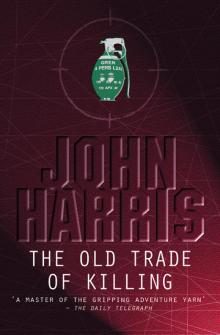 The Old Trade of Killing
The Old Trade of Killing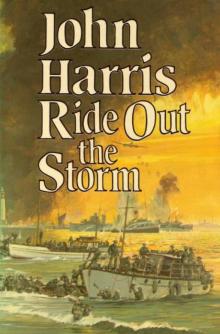 Ride Out The Storm
Ride Out The Storm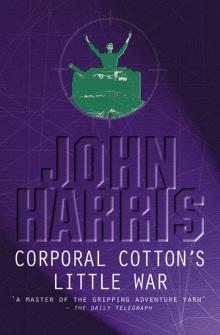 Corporal Cotton's Little War
Corporal Cotton's Little War Fox from His Lair
Fox from His Lair Paint The Rainbow
Paint The Rainbow Flawed Banner
Flawed Banner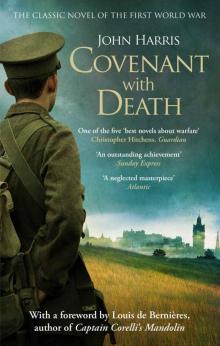 Covenant with Death
Covenant with Death So Far From God
So Far From God The Sea Shall Not Have Them
The Sea Shall Not Have Them The Cross of Lazzaro
The Cross of Lazzaro Smiling Willie and the Tiger
Smiling Willie and the Tiger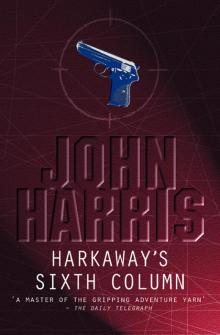 Harkaway's Sixth Column
Harkaway's Sixth Column The Sleeping Mountain
The Sleeping Mountain The Claws of Mercy
The Claws of Mercy North Strike
North Strike Picture of Defeat
Picture of Defeat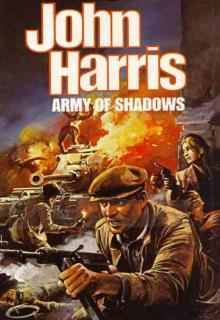 Army of Shadows
Army of Shadows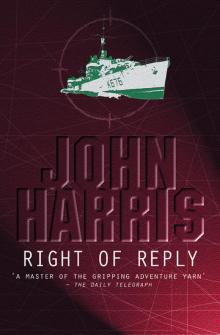 Right of Reply
Right of Reply Getaway
Getaway The Lonely Voyage
The Lonely Voyage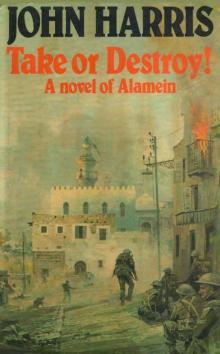 Take or Destroy!
Take or Destroy! The Backpacker
The Backpacker A Funny Place to Hold a War
A Funny Place to Hold a War Swordpoint (2011)
Swordpoint (2011) A Kind of Courage
A Kind of Courage